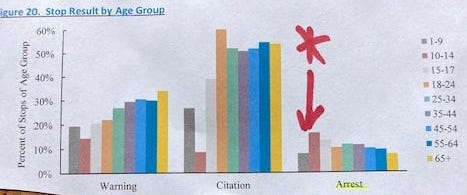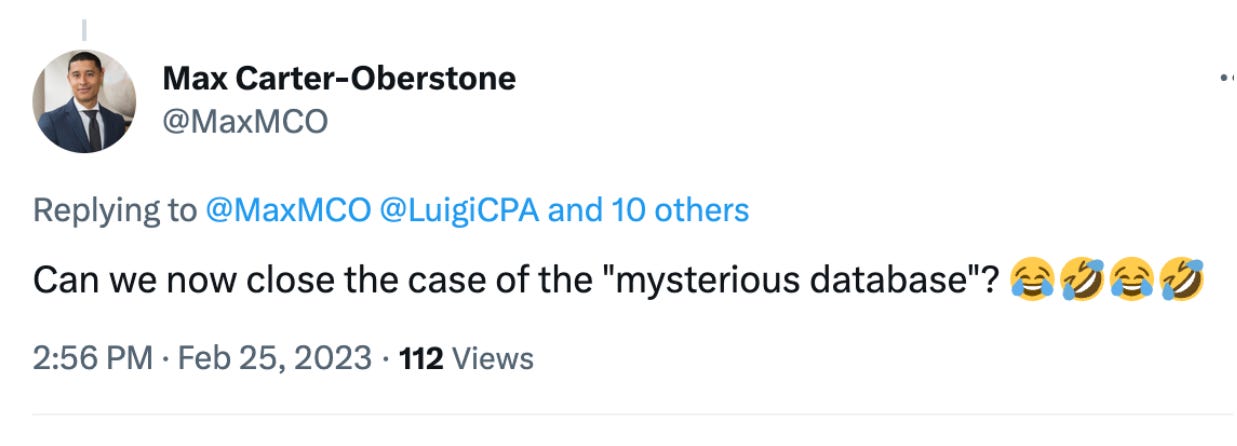Max Carter-Oberstone (MCO) has made the Prop 47-ization of pretext traffic stops his signature issue as a San Francisco police commissioner. Like the San Francisco Chronicle, MCO believes most traffic stops made by SFPD are racially motivated.
On November 4, 2022, MCO referenced on Twitter, a PPIC Notes (Public Policy Institute of California) study that found racial disparities in traffic stops made by police officers in California. PPIC based its findings (15thparagraph) on statistics provided by the Racial Identity Profiling Advisory Board (RIPA).
That means that the PPIC the Chronicle, and MCO are all relying on RIPA’s statistics which are materially misrepresentations.
I know I’ve beaten this to death, but the California Welfare & Institutional Code Section 602 specifically prevents law enforcement officers from arresting children under 12 years of age for driving, meaning it is impossible that RIPA could find an abundance of elementary school children getting arrested for driving (see graph below). Why the conflict? It is obvious that RIPA’s statistics are biased and factually incorrect, yet rather than MCO pursuing SFPD officers that supposably break the law by arresting 9-year-olds, he found it more convenient to perpetuate RIPA’s falsehoods.
Reviewing the Chronicle’s preposterous racist words story
On January 23, 2023, Chronicle writers, Susie Neilson and Justin Phillips, made the absurd claim that SFPD relied on the prevalent use of words such as: he, not, at, as, and, we, on, to, call, and a, to justify searching people of color. (These happen to be the most commonly used words in the English language.[1]) In my February 22, 2023 article, I questioned Neilson/Phillips on four issues:
Neilson/Phillips provided no specific link to where their data originated from, other than “Source: SFPD.” Thus, their story was not verifiable,
SFPD had no record of sending a spreadsheet to the Chronicle that included a “basis for search” column that Neilson/Phillips claimed the racial words came from,
Either SFPD wrote similar length narratives for all races, in which case, statistically, there was a 100% probability words existed that were used more frequently for Caucasians, or
SFPD was so hypersensitive to accusations of racism, that they wrote longer narratives for people of color. That would be consistent with the DOJ’s Collaborative Reform Initiative (pg. 74) findings that documented that a Caucasian pulled over by SFPD had a 64% greater likelihood of getting cited than a person of color.
When Neilson, the data reporter, did not defend her work, I contacted Dan Kopf, the Chronicle’s data editor. In response, Neilson emailed me on February 23, 2023, “Just wanted to let you know that we will be publishing the data the SFPD sent us on Github in the coming weeks.” Susie, three months have passed and I’m still waiting.
Why it is important to know how the Chronicle accessed SFPD’s data
The Chronicle’s silence on where the data came from is intriguing, especially since Neilson tweeted that the database had just fallen onto cowriter Megan Cassidy’s lap.
Cassidy was DA Chesa Boudin’s go-to person at the Chronicle for publishing his progressive angle. After Cassidy parroted Boudin’s words in an article, she would post a link to the article on Twitter, and then Boudin would marvel about the supposedly independent article that happened to confirm his views. Appearing to follow Boudin’s playbook, MCO retweeted the Neilson/Phillips’ article.
As a police commissioner, MCO would have direct access to SFPD traffic stop data. Unlike the Chronicle and me, he wouldn’t have to make a public records request, and it would be much more difficult to follow the trail on the flow of data through his hands.
If MCO was feeding data to the Chronicle—Boudin-style-- the significance would be threefold:
1) As a police commissioner, MCO is given the power to render decisions on whether SFPD officers violated laws or the Department’s General Orders. Essentially, he is a trier of facts. If MCO was secretly providing negative information on SFPD to the Chronicle, it makes him appear prejudicial and that he is campaigning against the Department. If the statistics he provided were cherry-picked and intentionally skewed, it renders him unfit to serve as a commissioner.
2) It illustrates how MCO cycled his data through the Chronicle to create a “third-party endorsement” rather than personally articulating the merits of his proposals, and
3) It is more irrefutable evidence that the Chronicle’s “data reporters” don’t independently discover, analyze, or objectively verify data. Instead, they acted as an echo chamber to the progressive’s spoon-fed propaganda.
Why it appears MCO fed the Chronicle SFPD traffic stop data
After my article appeared, MCO engaged me in on Twitter and explained how the Chronicle obtained the traffic stop data. Why he came to the Chronicle’s defense instead of Neilson/Phillips is suspicious by itself.
In our exchange, MCO pretty much admitted he was the one that accessed the data before the Chronicle:
1) “It took me a long time to get the data myself, I had to be persistent,”
2) “I’ve spent dozens of hours looking at the spreadsheets and they def include narratives like the ones discussed in the article.” When does MCO actually work as an attorney?
So, there you have it. MCO knew how to obtain the specific data, he had possession of the data, and he analyzed the data. Pretty easy to connect the dots.
Missing from MCO and Chronicle “data reporters” was exculpatory data on SFPD’s traffic stops
I contacted SFPD again and narrowed my search down to the single column as MCO had directed me.
The traffic stop data was so voluminous, it took 11 emails for SFPD to relay the data to me. Again, why is there no SFPD trail of the Chronicle receiving 11 emails from their “Source: SFPD?”
In Neilson/Phillips’ article, they claimed that any “words that show up in fewer than 100 total searches are excluded.” Presumably, their analysis was so comprehensive, they were forced to stoop to pick up racially harmless words like he, not, at, as, and, we, on, to, and a.
However, as I predicted in my February 22nd article, license, registration, and insurance appeared more than 100 times. My rudimentary word search also found that the following words also appeared more than 100 times: identification, observed, revealed, outstanding, expired, my, her, she, parole, probable cause, unsafe, open, partner, prudent, change, illegal, computer, violation, selling, traffic, improper, posted, container, failure, comply, yield, proof, stop, plates, cell phone, texting, dispatch, speeding, crack, and alcohol.
How could the Chronicle’s thorough “data reporters” and MCO possibly have missed all these words? Was it intentional? Was alcohol more frequently associated with traffic stops of Caucasians and that was ignored because it would have refuted the Chronicle’s and MCO’s narrative?
The traffic stop data also shows that many of detentions and searches were not even initiated by SFPD. On numerous occasions, SFPD was only called to take custody of contraband. For instance, TSA’s at SFO seized unloaded guns, illegal fireworks, butterfly knives, or marijuana and called SFPD merely to book the evidence. This explains how Neilson/Phillips were able to credit SFPD with such an unrealistically high 79.4% success rate of finding contraband in searches. But this mitigating information about SFPD’s merely procedural role in searches escaped MCO’s analysis and the Chronicle’s article.
Propagandizing Fiction
The Chronicle’s failure to cite their data source, Neilson’s failure to follow up on the promises in her email, and the absence of the license, registration and insurance traffic stops’ wordage all smells of a deliberate misrepresentation. It also means that the signature pretext stop policy changes Commissioner MCO fought to implement were based on RIPA data and word usage by SFPD that he knew to be flawed, but perpetuated it anyway to serve his conformation biases.
Watch how over the next few months, the three progressive police commissioners, Breed’s betrayer, and DPA use the Chronicle to advocate for their next project— disallowing SFPD to run (foot chase) after criminals. But we’re only doing it because we fear the officers might get hurt. Yeah, right.
It’s all fiction and it’s helping to drive the exodus from San Francisco of police officers, residents, and businesses.
And MCO, yes, we can close the case on the mysterious data base. Thank you.
[1] Of the 97 words Neilson/Phillips determined were racist, 28, or 29%, are the most common words in the English language per Wikipedia.











Lou - This is an excellent example of how cancer eats away at a body. Sometimes it can be growing, and the patient feels fine. No pain - no problem. But eventually it grows to a point where it can no longer be ignored.
In this case, I hold Chief Scott and his management team responsible for failing to clearly and concisely defend SFPD policies and procedures in a proactive manner. Simply put - SFPD stops
cars where the vehicle or driver present a concern to the officer for safety; whether than is a broken brake light or other mechanical issue, or the diver being distracted. Safety is the key. If Black or other
non-White drivers are being stopped more frequently, that suggests they are breaking DMV laws more frequently.
These so called reporters you mentioned appear to not be bound by any ethics that might prevent them from writing stories that damage their preferred view of the world.
When I was a kid our parents used to buy two different news papers, and we used them to line
our metal garbage cans. Now we use plastic trash bags instead, and won't pay for the trash the papers see fit to print!